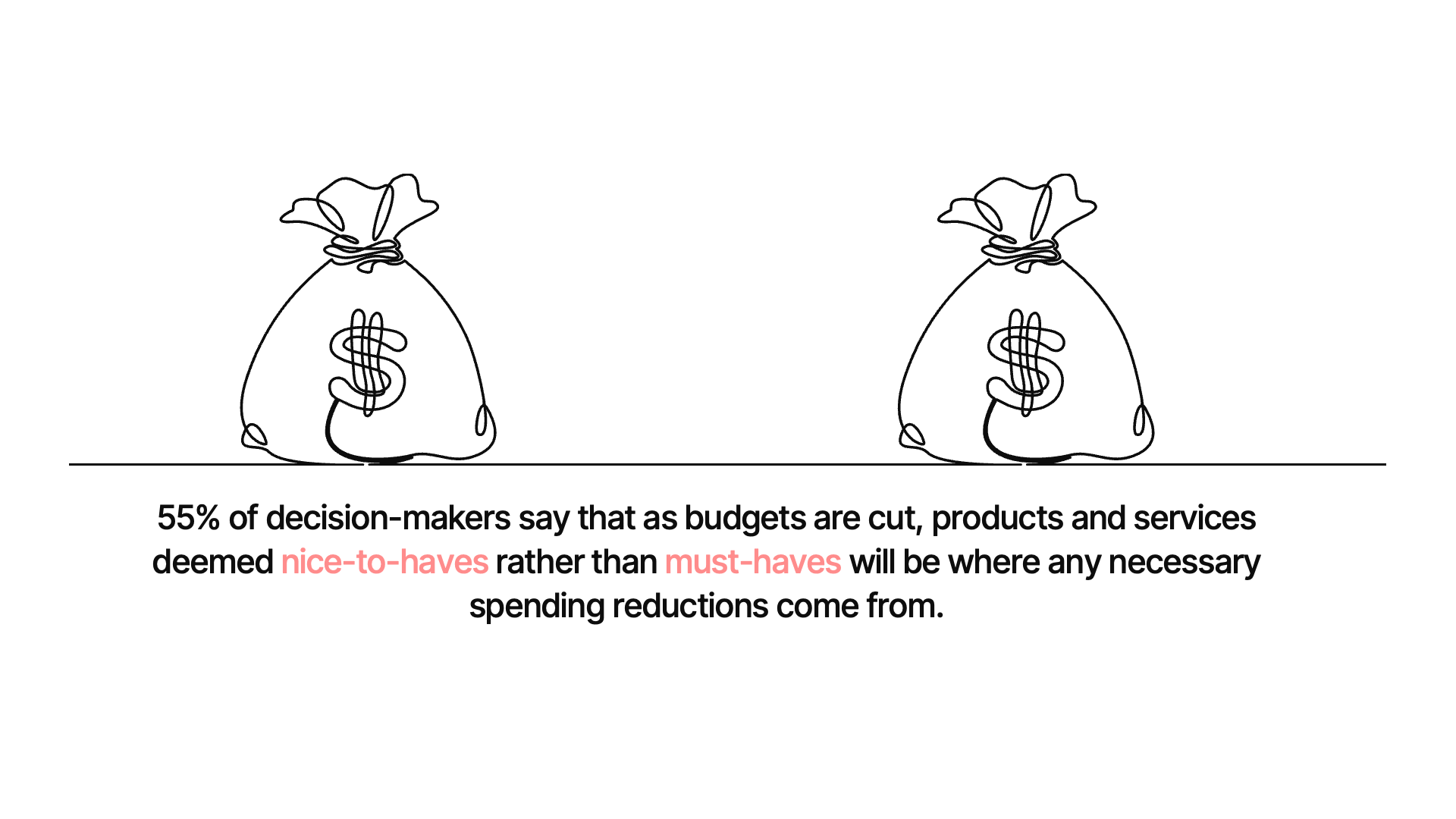Businesses around the world are facing a potential economic downturn that will disrupt many aspects of their operations, services, and activities. For many B2B companies, it is likely that budgets will tighten while sales cycles will extend т forcing decision-makers and C-suite executives to take a hard look at which partners are critical to running the business, and which are not.
With this backdrop top of mind, МЋРжЪгЦЕ and LinkedIn teamed up to produce our fifth annual B2B Thought Leadership Impact Report, offering insight into the buying behaviors of B2B decision-makers and C-suite executives during an economic downturn. The report taps the collective perspective of nearly 3,500 management-level professionals to help marketers, communicators and salespeople understand the value that thought leadership can provide amid times of great uncertainty.
Simply put, thought leadership refers to content that is made available for free and shares insightful and unique perspectives in your field of expertise to help solve customer problems. This yearтs study reveals that high-quality thought leadership will be more important than ever for organizations seeking to break through with decision-makers at current and prospective clients. It also identifies what B2B decision-makers and C-suite executives expect from thought leadership during this time.
The findings shed light on how your organization can refresh and improve the way it approaches and delivers thought leadership т ultimately giving you the tools you need to position your products and services as crucial to your customersт success during a time of increased scrutiny.
WHAT YOU NEED TO KNOW
- Most B2B companies are planning for an economic downturn in 2023. That means itтs going to be more challenging than ever for suppliers to get the attention of decision-makers and successfully pass the procurement process.
- If a downturn does materialize, those products and services deemed non-critical will likely be first on the chopping block. Sellers navigating a stricter procurement process cannot just тmeet the briefт and expect success. Instead, they must prove they are essential to helping prospective customers succeed, even during tough times.
- Thought leadership is one of the most effective tools an organization can use to demonstrate its value to customers during a tough economy т even more so than traditional advertising or product marketing, according to B2B buyers.
- Decision-makers expect high-quality thought leadership to offer a strong, data-backed point of view on how to succeed during a downturn. And they report it can make a difference in winning their business.
- Producers of thought leadership have high expectations for its ability to support their business during a downturn. Yet, many have low confidence in its quality. This period of unpredictability offers an opportunity for B2B companies to improve the way they deliver thought leadership and measure its impact.
Most B2B companies are planning for an economic downturn in 2023. That means itтs going to be more challenging than ever for suppliers to get the attention of decision-makers and successfully pass the procurement process.
A global economic downturn seems all but assured. Itтs no surprise, then, that our research finds that B2B companies are busy preparing for stormy times. We found that 64% of C-suite executives say their organizations have tightened up their procurement process in anticipation of looming challenges. Additionally, 44% of decision-makers say they will be personally less receptive to sales calls and marketing outreach if a downturn hits. The bottom line is that it will be harder than ever to break through and win business.

If a downturn does materialize, those products and services deemed non-critical will likely be first on the chopping block. Sellers navigating a stricter procurement process cannot just тmeet the briefт and expect success. Instead, they must prove they are essential to helping prospective customers succeed, even during tough times.

Clearly, some products and services will remain critical to customersт business operations т their value will not be in question. Everyone else, however, will need to prove that they are worth the investment of valuable resources.
Despite this gloomy reality, there is a flicker of good news. Our research found that 91% of decision-makers say that non-business-critical providers can still take important actions to increase their chances of surviving a more cutthroat environment. In particular, 54% of decision-makers say that such companies can increase their chances of winning business by proving that they will increase profit margins or minimize losses, while 51% say they can do so by showing they can help them outperform, or take market share, from competitors.
How can providers demonstrate this authentically? Thatтs where thought leadership comes in.
We found that thought leadership is one of the most effective tools an organization can use to demonstrate its value to customers during a tough economy т even more so than traditional advertising or product marketing, according to B2B buyers.
In B2B marketing, itтs well known that nothing matches the value of a direct referral. But among the many tactics in the marketerтs toolbox т advertising, trade shows, in-person sales pitches and more т thought leadership emerges as the most effective in demonstrating a providerтs potential value.

In fact, downturns can heighten the power of thought leadership in helping organizations win business. Our research shows that 50% of C-suite executives say that high quality thought leadership has more impact on their purchase decision-making during economic downturns than when times are good.
Whatтs more is that decision-makers expect high-quality thought leadership to offer a strong, data-backed point of view on how to succeed during a downturn. And, they report it can make a difference in winning their business.

Our research over the past four years demonstrates that while good thought leadership can strengthen a businessт position in the marketplace, itтs always been difficult to capture the attention of customers. For providers deemed non-critical, breaking through during a downturn will require thought leadership thatтs finely tuned both to broader economic realities and the specifics of a customerтs industry. In this regard, decision-makers expect the following of thought leadership from providers:
- Demonstrates an understanding of our organizationтs major pain points (43%)
- Identifies new opportunities or industry trends stemming from the economic downturn (48%)
Itтs important to recognize that many of those who consume thought leadership also produce it. Of the thought leadership consumers we surveyed, nearly 1,000 of them work for organizations that also produce their own thought leadership. Moreover, they tend to have high expectations for the thought leadership they publish. Specifically, 60% expect it to keep their brand and capabilities top of mind during a downturn even among clients or prospects who cannot buy from them because of budget constraints. And 49% expect it to protect their current client relationships from disruption or shrinkage.
Yet, worryingly, they tend to express relatively little confidence in the quality of thought leadership their organization publishes.

There is an opportunity to better measure thought leadershipтs impact т and, importantly, connect it to business wins. Our research shows that just 40% of thought leadership producers say they measure its effectiveness by linking business wins back to specific pieces of content. Rather, the most common way their organizations determine effectiveness is by looking for increased website and social media traffic (51%) т a metric too broad to be meaningful in this regard.
As we enter a period of uncertainty, there is an opportunity for B2B companies to improve how they deliver thought leadership and measure its impact. Doing so can help you position your products and services as vital to your customersт success during a challenging period.
If they havenтt done so already, companies should move quickly to adjust their publishing strategy for the period ahead.
GET IN TOUCH:




